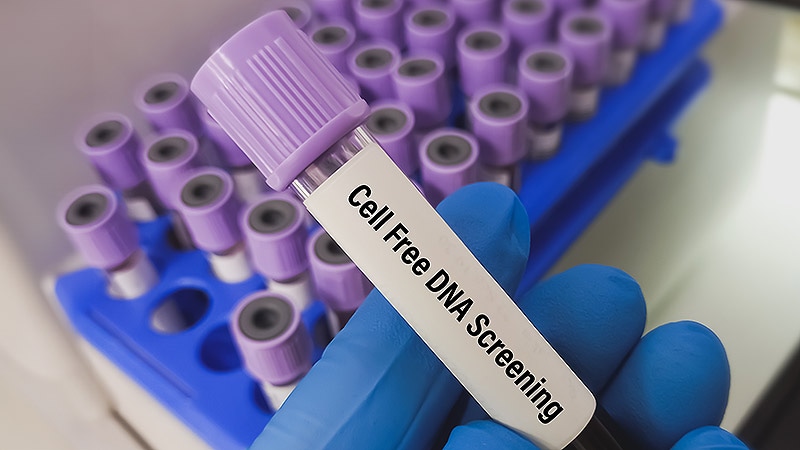Core Concepts
cfDNA in plasma aids IBD diagnosis.
Abstract
In patients with inflammatory bowel disease (IBD), the measurement of microbial cell-free DNA (cfDNA) in plasma can help differentiate between active and asymptomatic disease, as well as distinguish between ulcerative colitis and Crohn's disease. The study presented at the Crohn's & Colitis Congress® highlighted the potential of cfDNA as a biomarker for disease severity and type. The research showcased the effectiveness of cfDNA in identifying disease activity and differentiating between IBD and non-IBD conditions.
Key Highlights:
cfDNA in plasma assists in IBD diagnosis.
Karius Test by Karius Inc. shows promise in infection testing.
cfDNA serves as a valuable biomarker for various conditions.
Study included patients with Crohn's disease and ulcerative colitis.
cfDNA shows high sensitivity and specificity in distinguishing IBD.
Future studies planned to explore cfDNA's role in disease severity.
Cell-Free DNA May Inform IBD Diagnosis
Stats
"cfDNA distinguished between patients with Crohn's disease, ulcerative colitis, and those who were asymptomatic."
"It distinguished between patients with IBD and those who were asymptomatic with a sensitivity of 99.5% and a specificity of 90%."
Quotes
"I think it's an intriguing method that we haven't seen used as a predictor in IBD."
"Using this as a biomarker of disease type is very intriguing for confirming a diagnosis."
Key Insights Distilled From
by Jim Kling at www.medscape.com 02-05-2024
https://www.medscape.com/s/viewarticle/cell-free-dna-may-inform-ibd-diagnosis-2024a10002hn
Deeper Inquiries
How can cfDNA be utilized beyond IBD diagnosis?
Cell-free DNA (cfDNA) has shown promise beyond just diagnosing inflammatory bowel disease (IBD). It has been utilized as a biomarker in various conditions such as cancer screening, diagnosis, and monitoring, prenatal testing, and organ monitoring post-transplantation. The ability of cfDNA to detect DNA released by both human and microbial cells after cell death makes it a versatile tool for a range of diagnostic applications. For example, in cancer, cfDNA can be used to detect specific mutations or genetic alterations associated with different types of cancer, aiding in early detection and personalized treatment strategies. In prenatal testing, cfDNA from the fetus can be detected in maternal blood, offering a non-invasive method for screening for genetic abnormalities. Overall, the use of cfDNA in various medical contexts highlights its potential as a valuable diagnostic tool beyond IBD.
Is there a risk of confounding results due to microbial signatures from other conditions?
There is a potential risk of confounding results in cfDNA analysis due to microbial signatures from other conditions such as colorectal cancer and infections. These conditions can also produce microbial signatures that may overlap with those seen in IBD, leading to misinterpretation of the cfDNA results. To address this concern, it is crucial to establish specific microbial species biomarkers and a robust classification scheme to ensure consistent and accurate performance of cfDNA analysis. Additionally, comparing cfDNA findings to serum samples from conditions like Clostridium difficile, norovirus, and colorectal cancer can help validate the specificity of cfDNA in distinguishing between different diseases. By conducting comprehensive studies that account for potential confounders, the reliability and accuracy of cfDNA as a diagnostic tool can be enhanced.
How might the use of cfDNA impact the future of non-invasive diagnostic testing?
The use of cfDNA has the potential to revolutionize non-invasive diagnostic testing by offering a minimally invasive and highly sensitive method for detecting various diseases. In the context of IBD, cfDNA has shown promise in distinguishing between active and asymptomatic disease states, as well as differentiating between ulcerative colitis and Crohn's disease. This ability to provide valuable diagnostic information from a simple blood test can significantly improve patient care by enabling early detection, monitoring disease progression, and guiding treatment decisions. Furthermore, the non-invasive nature of cfDNA testing makes it particularly appealing for patients who may be averse to invasive procedures or for whom such procedures are not feasible. As research continues to validate the utility of cfDNA in different medical conditions, its widespread adoption could lead to a paradigm shift in diagnostic approaches, offering a more patient-friendly and efficient way to diagnose and manage various diseases.
0
